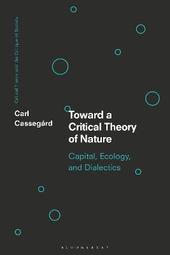
|
Toward a Critical Theory of Nature: Capital, Ecology, and Dialectics
Paperback / softback
Main Details
| Title |
Toward a Critical Theory of Nature: Capital, Ecology, and Dialectics
|
| Authors and Contributors |
By (author) Carl Cassegard
|
| Series | Critical Theory and the Critique of Society |
|---|
| Physical Properties |
| Format:Paperback / softback | | Pages:256 | | Dimensions(mm): Height 234,Width 156 |
|
| Category/Genre | Human geography |
|---|
| ISBN/Barcode |
9781350213999
|
| Classifications | Dewey:304.201 |
|---|
| Audience | | Professional & Vocational | |
|---|
| Illustrations |
10 bw illus
|
|
Publishing Details |
| Publisher |
Bloomsbury Publishing PLC
|
| Imprint |
Bloomsbury Academic
|
| Publication Date |
25 August 2022 |
| Publication Country |
United Kingdom
|
Description
Challenging the normalization of a capitalist reality in which environmental destruction and catastrophe have become 'second nature', Towards a Critical Theory of Nature offers a bold new theoretical understanding of the current crisis via the work of the Frankfurt School. Focusing on key notions of dialectics, natural history, and materialism, a critical theory of nature is outlined in favor of a more traditional Marxist theory of nature, albeit one which still builds on core Marxist concepts to confirm humanity's central place in manufacturing environmental misery. Pre-eminent thinkers of the Frankfurt school, including, Georg Lukacs, Ernst Bloch, Theodor Adorno, and Alfred Schmidt, are highlighted for their potential to diagnose the interpenetration of capitalism and nature in a way that neither absolutizes nor obliterates the boundary between the social and natural. Further theoretical claims and practical consequences of a critical theory of nature challenge other contemporary theoretical approaches like eco-Marxism, social constructivism and new materialism, to situate it as the only approach with genuinely radical potential. The possibility of utopian idealism for understanding and responding to the current climate crisis is carefully measured against the dangers of false hope in setting out realistic goals for change. Environmental change in turn is seen through the prism of recent cultural currents and movements, situating the power of a critical theory of nature in relation to understandings of the Anthropocene; concepts of apocalypse, and postapocalypse. This book culminates in a powerful tool for an anti-capitalist critique of society's painfully extractive relationship to a deceptively abstracted natural world.
Author Biography
Carl Cassegard is Professor in the Department of Sociology and Work Science at The University of Gothenburg, Sweden, where he is currently researching environmental activism.
ReviewsWhile the Dialectic of Enlightenment is often dismissed for its supposed pessimistic dead-end, this book shows how Adorno's approach allows one to scrutinize environmental catastrophes in a critical and reflexive manner while highlighting the political and ethical implications contained therein. * Alexander M. Stoner, Assistant Professor of Sociology, Northern Michigan University, USA * Catastrophic climate events are already happening. Cassegard finds in Adorno a critical theory of nature that highlights our destructive behaviour even as it reminds us that we are part of the nature that we are destroying. He asks us to struggle on the side of nature to tame capitalism. * Deborah Cook, Professor Emeritus of Philosophy, University of Windsor, Canada * Cassegard's work represents an important correction in a debate that knows so little about critical theory. * Soziopolis (Bloomsbury Translation) *
|